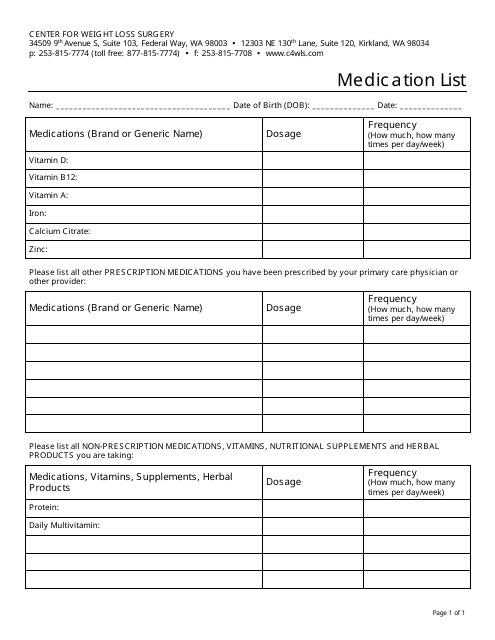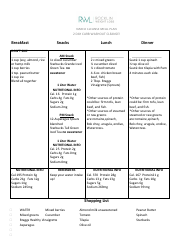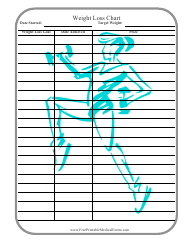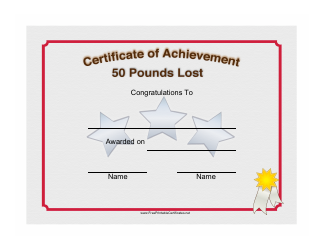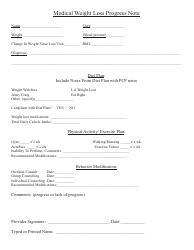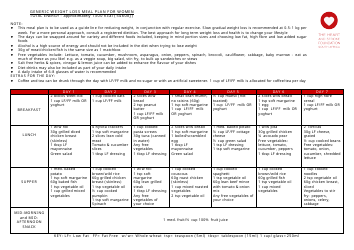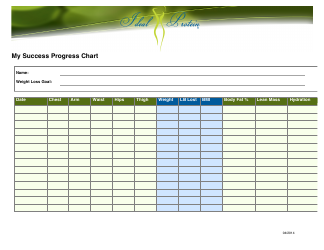Medication List - Center for Weight Loss Surgery
The Medication List - Center for Weight Loss Surgery document is typically used to keep an accurate record of all the medications, including prescription drugs, over-the-counter remedies, and vitamins/supplements, that a patient is currently taking or has been previously prescribed.
This document is particularly crucial for patients who are about to undergo weight loss surgery. It helps healthcare professionals manage potential interactions between the patient's current medications and the drugs that might be used during and after surgery.
Moreover, it's also important post-surgery as it assists the medical team in determining the most effective pain management and care routine. Just as importantly, it ensures that the patient doesn't accidently consume anything during their recovery process that may interfere with their prescribed treatment plan.
The medication list for weight loss surgery is typically filed by the patient themselves with the guidance of their healthcare provider. The medical providers in the Center for Weight Loss Surgery need to know all medications that a patient is taking, including prescription drugs, over-the-counter medications, vitamins, and herbal supplements, in order to prepare for the surgery and postoperative care. The center might have a medical staff such as a nurse or doctor to review the medication list and file it accordingly.
FAQ
Q: What is the Center for Weight Loss Surgery?
A: The Center for Weight Loss Surgery is a medical institution that focuses on various surgical procedures for weight loss, including bariatric surgery and other related procedures designed to help individuals struggling with obesity to lose weight efficiently and healthily.
Q: What medications are commonly used in a Center for Weight Loss Surgery?
A: The specific medication list may vary depending on the type of weight loss surgery and individual patient needs. However, it often includes pain relievers, anti-nausea drugs, anticoagulants to prevent blood clots, and possibly vitamin and mineral supplements to prevent deficiencies due to changed food absorption after surgery.
Q: Why might patients need medication after weight-loss surgery?
A: After surgery, medications are usually given to manage pain, reduce inflammation, prevent infection, treat potential side effects like nausea or constipation, and reduce the risk of complications such as blood clots. Medications may also be needed long-term to prevent nutritional deficiencies caused by reduced food intake and malabsorption.
Q: Do I have to take medication permanently after weight loss surgery?
A: Permanency of medication after weight loss surgery depends on individual patient needs and the type of surgery. Some patients may need to take certain medication or supplements indefinitely to prevent nutritional deficiencies. It's essential to talk with your healthcare provider for specific guidance.
Q: What are some of the risks of weight loss surgery?
A: Risks of weight loss surgery may include bleeding, infection, blood clots, leakage in the gastrointestinal system, adverse reactions to anesthesia, complications from nutritional deficiencies, and the possibility of weight regain over time. However, for many people, the benefits of weight loss surgery greatly outweigh the potential risks.
Q: Can medications help with weight loss?
A: Yes, certain medications can assist with weight loss. They usually work by suppressing appetite, increasing feelings of fullness, or reducing absorption of fat. However, these should only be taken under the supervision of a healthcare provider as they can have side effects and are not suitable for everyone.
